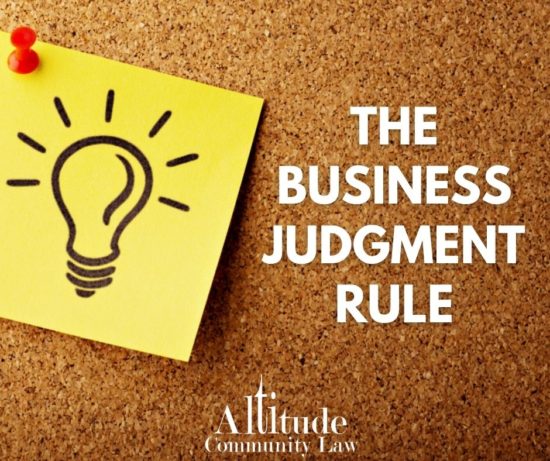
The Colorado Court of Appeals recently issued a decision confirming that a board of directors that reasonably interprets a validly adopted rule or regulation of the association is protected from liability. The crux of the decision is this:
If claims alleging rule violations by a board of directors or nonprofit corporation do not involve allegations of fraudulent conduct, self-dealing, or similarly wrongful conduct, the courts will not override the board’s discretionary interpretation and application of validly-adopted rules.
This is the most recent Colorado appellate discussion about the “business judgment rule”, which is an important legal protection for community associations and their board members. The essence of the business judgment rule is that the good faith acts of directors of a nonprofit organization that are within their powers and made within the exercise of an honest business judgment are valid. This decision cautions that the courts should not second-guess the decisions of an organization except in limited circumstances.
Those limited circumstances include: fraud, self-dealing, unconscionable contracts, bad faith, arbitrary conduct, and a failure to follow mandatory procedures. If there is a true justification and provable evidence for those claims, a legal remedy may be available for members against the organization. On the other hand, if somebody challenges the valid interpretation of an authorized rule, no legal liability to the board should result because of the protection afforded by the business judgment rule.
This most recent case is known as Walker v. Women’s Professional Rodeo Association, Inc., and was decided by the Colorado Court of Appeals on August 5, 2021. The Walker case should provide solace to volunteer board members in addition to several Colorado statutes that already provide a qualified immunity from suit for board members. There are also several Colorado cases upholding the business judgment rule in the community association setting. In addition, the association’s insurance protection will usually extend protection to current and former board members and committee members. This recent decision speaks directly to a nonprofit’s discretionary interpretation of rules, which is the source of many legal disputes in the community association setting.
Recurring and troubling trends in our society include people who disavow self-accountability and collective interests and file selfish lawsuits about how “somebody is going pay.” These undercurrents discourage good folks who give back to their community associations (or pay it forward) by volunteering their time and energy in leadership roles. The Walker case should help to “walk us back” from the precipice of groundless liability lawsuits, leading to more constructive engagement in our community associations.
Please contact an Altitude Community Law attorney if you have any questions concerning the business judgment rule at 303.432.9999 or at [email protected].